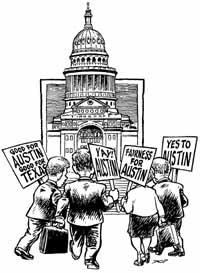All-Star Team
By Jenny Staff, Fri., Dec. 4, 1998
|
|
When the Texas Legislature convenes its 76th regular session this Jan. 12, a passel of legislative gunslingers will ride up to defend the capital city ready for war, raring to ward off the aggression of the representatives who come to town every other year.
Or maybe not. For the next round of legislative goings-on, Austin will employ the same kind of savvy, connected advocates retained by hard-core lobbyers like Southwestern Bell. Once upon a time, our city either ignored or antagonized the state officials that arrive biannually in our midst. That's not the case anymore. Driven by Mayor Kirk Watson, a big believer in the insider approach and reportedly a master at it himself, the city is committing to a substantive -- and cozy -- relationship with the Lege.
Last week in executive session, the council approved an expenditure of up to $1.138 million to hire at least a baker's dozen of high-powered lobbyists (see box). The first year's lobbying budget -- $604,000 -- is already accounted for in the fiscal '98-'99 budget; the second year's -- $534,000 -- was not, and will only be spent if funds are available.
If this group were an athletic team, it would surely be a contender for its sport's title. Experienced and versatile, with a deep bench, as well as the high salaries common to sports stars, this is an outfit that plays to win. What will our distinguished lobbyists (already, and inevitably, dubbed the Dream Team) be working on come January? Naturally, the council did not publicize its approval of the contract -- which was okayed at the end of a Wednesday work session, without discussion or public comment -- since it could be perceived by some as rather extravagant. But as council and Lege watchers are aware, the Capitol and the council chamber have had a relationship in recent years that is thorny at best, and requires some tending to. The city of Austin has been "misunderstood" by legislators from far-flung locales where they care nothing for Smart Growth, who would surely frown upon spending two years fighting a shopping center that promised a grocery/movie theatre/bookstore combo.
Though the Lege's incomprehension of Austin and its ways might be somewhat understandable, given our collective civic eccentricities, they have gone overboard in the past in their response. The infamous "Austin bashing" session, the 74th Legislature of 1995, produced a variety of bills that seemed designed expressly to punish the city for overstepping its bounds in the areas of land use and water quality protection. The courts agreed, and struck several of them down, because they were directed specifically at one city -- Austin -- a practice forbidden by the Texas Constitution. But the conflicts that inspired these bills are still with us, and are still hot issues, in fact. A few of the most salient ones, certain to be high priorities of the new lobby team, are:
* Land use. This is the big one, encompassing everything from water quality to the zoning of state-owned land within city limits. Old grudges and smoldering debates cloud many land-use issues. After the aborted Special Board of Review meeting earlier this summer, for example, a frustrated Land Commissioner Garry Mauro told reporters that the Triangle would probably be the last development done under current rules, as the Legislature would likely retaliate for Austin's actions by diminishing its power to decide how state-owned land within the city is developed.
This session is also likely to see a rewrite of SB1704, accidentally repealed last session during the passage of the state's omnibus water bill, SB1. The bill allowed developers to build according to the development regulations that were in place when they filed their site plans, instead of when construction on the project actually began. Austin adopted an interim measure that's intended to mollify the complainants, but Son-of-SB1704 is on its way. With its powerhouse of lobbyists, Austin leaders want a role in rewriting the inadvertently repealed law.
* Annexation. In 1995, a failed measure by then-representative, now Agriculture Commissioner-elect Susan Combs would have prohibited annexations except by a vote of the people being annexed, and that was before the city annexed tens of thousands of unwilling, angry suburbanites, including GOP Rep. Terry Keel. Revenge is likely, absent a valiant peacemaking effort on the part of the city.
* Electric deregulation. After several false starts, this might be the year the state finally deregulates the electric utility industry. Then again, it might not, but the city utility stands to gain -- or lose -- a lot, depending on how it all shakes out. The council has already shown a commitment to readiness-for-competition measures such as a hefty PR budget devoted in part to developing "brand identification" for Austin Energy, so getting in on the action at the Capitol is the next logical step.
How will the lobby team improve Austin's lot on these issues? Hopeful folks at City Hall say that the hiring of the lobbying team will signal to legislators that a new era of cooperation has dawned. "We will articulate our case as well or better than it has ever been articulated. [The team will bring] balance, strength, maturity, and relationships to the table for Austin," said Councilmember Beverly Griffith.
As for the expense, the council considers it a pre-emptive strike against the passage of laws that could cost the city millions in legal fees from the challenges and lawsuits that have sprung from the Austin-bashing laws and their attendant challenges. Said Griffith: "One of the things we looked at was what we have to lose. The legal expense that we've experienced over the past several years because of lack of success at the Lege -- it is multi-multi-millions. I really expect us to have savings in the coming years because of the investment we're making."
And then there's Council Place 1's own Daryl Slusher, who during the Austin bashing of '95 lobbed bombs at the Capitol from this very space as a Chronicle writer. Slusher was a critic both of the Legislature's activities and of the city's lobbying efforts, noting that Austin lobbyists passed the entire 1995 session without once visiting Lt. Gov. Bob Bullock, arguably the most powerful man in all the state Capitol. (Back then, as Slusher reported, the city's lobbying budget was only about $400,000, so maybe they thought they were only hired for part-time work.)
How do things look to him now? The former columnist -- who at the time insisted that "the 1995 Legislature's political forebears were carpetbaggers and scalawags" -- is now charged with the art of leadership and compromise, and is in a much more conciliatory mood. Councilmember Slusher said he was optimistic about the city's prospects, and looked forward to participating in the effort, testifying before legislative committees and the like. He added that the city had made progress in remedying its image as uncompromising, extremist environmentalists. He cited the Lost Creek settlement, where the city settled out of court with Club Corp., allowing the company to develop more of its property than S.O.S. standards allow in return for certain water quality mitigation measures. The deal showed that while they still have that pesky commitment to water quality, the council does not worship exclusively at the altar of the Save Our Springs ordinance, and is willing to strike a reasonable compromise.
But though the city does want to please the Legislature, it's not imperative that the two bodies agree on land-use, or any other philosophy, said Slusher. "A philosophical divide shouldn't matter, because of local control," he said. "The courts have made it very clear that cities have the right to local control."
We'll see if it works out that way in practice. For perhaps the first time ever, the city has a first-rate lobbying team, a united council with a majority of support among Austinites, and an ambitious and politically sophisticated mayor -- all the tools a successful advocacy outfit needs. Who knows, though? Despite the city's best efforts, the legislators may still find Austin, its politics, and its policies inscrutable.
This Week in Council: The council will consider a whopper of a downtown plan, which includes the construction of a new city hall facing Town Lake, the purchase of the William P. Hobby office building from the state of Texas, and a 99-year lease to the CSC software development corporation. Expect a crowd for tonight's (Thursday, Dec. 3) 5pm hearing. See the Nov. 20 edition of "Council Watch" for more details.
And in South Austin news, the council is proposing to codify the gentrification of South Austin, with a zoning overlay that would prohibit certain kinds of businesses along South Congress, South First, and Oltorf streets. Among the undesirables are auto repair shops, plasma donation centers, and any establishment with a drive-up window. Though the list was developed in consultation with South Austin neighbors, even some among the council's regular supporters say that they've gone too far this time, and less friendly audiences (including KVET's Sammy and Bob, who called the overlay "as close as you can get without actually coming in with artillery and taking a business") are downright steamed. Rumor has it the opposition may get the item pulled off the agenda altogether, but if it doesn't, the public hearing is scheduled for 7:30pm. Come on down.
Got something to say on the subject? Send a letter to the editor.









